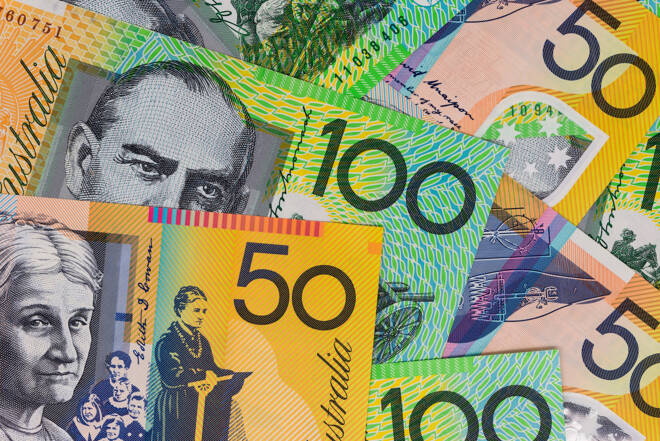Advertisement
Advertisement
AUD to USD Forecast: RBA and Fed Speeches to Set Tone for Aussie Dollar
By:
China's new loan figures matter – weaker new loans may signal lower demand and affect the Aussie economy and the Aussie dollar.
Highlights
- The AUD/USD declined by 0.13% on Friday, ending the session at $0.63580.
- Sentiment toward the RBA and the Fed left the Aussie dollar in negative territory on Friday.
- On Monday, the RBA, new loan figures from China, the Fed, and US consumer sentiment will draw investor interest.
Friday Overview of the AUD/USD
The AUD/USD declined by 0.13% on Friday. Following a 0.55% loss on Thursday, the Aussie dollar ended the day at $0.63580. The Aussie dollar climbed to a high of $0.63697 before falling to a low of $0.63385.
The RBA in Focus Early in the Morning Session
On Monday, the RBA’s Dr. Marion Kohler is on the calendar to speak. Investor sensitivity to references to interest rates will likely intensify. A hawkish view on interest rates could fuel investor appetite for the AUD/USD.
The dovish RBA rate hike and the recent RBA Statement on Monetary Policy have sent mixed signals vis-à-vis interest rate goals.
The RBA Rate Statement lacked a commitment to further rate hikes. In contrast, the RBA Statement on Monetary Policy highlighted upward revisions to growth and inflation, threatening a more hawkish rate path.
China New Loans to Reflect the Demand Environment
Later in the session, new loan figures from China also need consideration. Economists forecast new loans of CNY665 billion in October vs. CNY2,310 billion in September. Weak new loan figures could signal a weak demand and consumption outlook.
China is Australia’s largest trade partner, accounting for one-third of Australian exports. A weak demand environment could impact the Australian economy and the Aussie dollar.
Australia has a trade-to-GDP ratio above 50%. Significantly, 20% of the Australian labor market is trade-related. A deteriorating labor market environment could affect spending and the Australian economy. Australian private consumption contributes over 55% to the economy.
US Consumer Sentiment and the Fed in the Spotlight
The IBD/TIPP Economic Optimism Index will warrant investor attention on Monday. A negative consumer outlook on the economy may affect consumer spending. US private consumption contributes over 60% to the US economy. A downward trend in consumer spending could induce recessionary jitters and fear of a hard landing.
Economists forecast the IBD/TIPP Economic Optimism Index to increase from 36.3 to 40.2. Notable, sub-50 signals consumer pessimism toward the US economy and economic outlook.
Beyond the numbers, FOMC voting member Lisa Cook is on the calendar to speak on Monday. Hawkish forward guidance on interest rates could drive demand for the US dollar.
Short-Term Forecast
Monetary policy divergence remains tilted toward the US dollar before US inflation numbers on Tuesday. RBA and FED speeches will guide the AUD/USD on Monday. Hawkish speeches could support an Aussie dollar leg up after the RBA Rate Statement fueled sell-off.
AUD/USD Price Action
Daily Chart
The AUD/USD sat below the 50-day and 200-day EMAs, sending bearish price signals.
A break above the $0.63854 resistance level would support a move to the 50-day EMA.
RBA commentary, Fed speeches, new loans from China, and US consumer sentiment will influence the Monday session.
A fall below $0.63500 would give the bears a run at the $0.62749 support level.
A 14-period Daily RSI reading of 46.80 suggests a fall to the $0.62749 support level before entering oversold territory (typically below 30 on the RSI scale).
4-Hourly Chart
The AUD/USD remains below the 50-day and 200-day EMAs, reaffirming bearish price signals.
A break above the $0.63854 resistance level would support a move through the 50-day and 200-day EMAs.
However, a drop to $0.63000 would bring the $0.62749 support level into play.
The 14-period 4-Hourly RSI at 32.76 indicates an AUD/USD drop below $0.63500 before entering oversold territory.
About the Author
Bob Masonauthor
With over 28 years of experience in the financial industry, Bob has worked with various global rating agencies and multinational banks. Currently he is covering currencies, commodities, alternative asset classes and global equities, focusing mostly on European and Asian markets.
Advertisement
